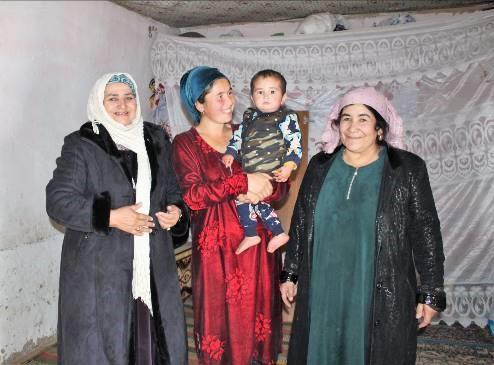Where We Work
See our interactive map


Malika Pirimova poses with health volunteers and her son in Vakhsh District. Photo credit: Tajikistan Health and Nutrition Activity.
Health fairs and community health volunteers work together to help women and children access health services.
By 23, Malika Pirimova was caring for a two-year old daughter, a one-year old son, and was three-months pregnant with her third child. Navbunvod, the mountain village she lives in, has limited access to roads, public health centers, and hospitals. As such, Malika gave birth to her two older children without antenatal care and never took them to a pediatrician.
When she became pregnant for a third time, she was concerned for her then nine-month old son. “My son was very thin, and I almost did not breastfeed him, as I did not understand how important it is,” says Pirimova. “He did not know how to walk or stand, but we could not afford the travel expenses to the health center. In May 2019, my neighbors Robiyamoh and Oyimgul came to my house. They introduced themselves as volunteers for the Tajikistan Health and Nutrition Activity. They both brought many changes to our lives.”
Robiyamoh Sharipova and Oyimgul Pirmakhmadova are two of 1,300 community health volunteers who are part of the USAID-funded Feed the Future Tajikistan Health and Nutrition Activity. Each health volunteer is responsible for 100 households, which they visit once a week. They donate their valuable time to teach villagers about health, nutrition, sanitation, and hygiene, and, in close cooperation with professional health workers, they identify children with signs of malnutrition and diarrhea, and refer pregnant women who have not been registered for prenatal services to health facilities.
“Malika’s one-year-old son, Mustafo, was very weak,” says Pirmakhmadova. “Doctors decided to hospitalize the child and his mother urgently.” Mustafo, who was stunted and wasted due to malnutrition, received treatment at the central hospital and his health rapidly improved.
The project gave my son a new life.
Sharipova and Pirmakhmadova also organized a local health fair with support from the Tajikistan Health and Nutrition Activity. The project has organized similar events since 2018 with the Khatlon Provincial Department of Health. The fairs help women and children access free health services that are otherwise not available to them by bringing health workers to remote villages and teaching women and mothers how to care for themselves and their children.
“I studied only four grades. I did not know anything about family life or newborn health. I did not understand that my son was very sick. Moreover, I did not realize that giving birth every year can greatly affect my health,” says Pirimova. “If the project volunteers did not find me, my son could have died. I just can't express my gratitude with simple words. The project gave my son a new life.”
From October 2018 to September 2019, the Tajikistan Health and Nutrition Activity’s community health volunteers conducted 303,993 household visits. They identified and referred 1,044 children under five with suspected malnutrition and 3,158 children with diarrhea to local primary health care centers. Altogether, the project reached 4,617 community members with maternal, newborn, and child health services through 48 community health fairs.
IntraHealth International leads the USAID-funded Feed the Future Tajikistan Health & Nutrition Activity. With our partner Abt Associates, we work to improve health and nutrition of women and children in the Khatlon region. The activity integrates quality maternal, newborn, and child health care at the family, community, clinical, and national levels, with an emphasis on nutrition, sanitation, and hygiene.
Get the latest updates from the blog and eNews




